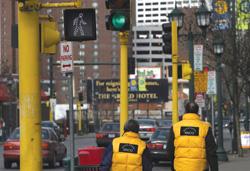
I am re-posting an article here from the Southwest Journal ( which I have been in before ) because I volunteer with the SSCO Block Patrol. The article is specifically about this program. The article can articulate in a way I don't usually - in a professional journalistic manner. ;)
Photo to the left is Dave Delvoye ( FT employee of SSCO as its safety director) and my neighbor Judy Austin ( who I used to live right across from).
Hope you enjoy it:
-----------------------
Solvitur Ambulando: “It is solved by walking”
By Kari VanDerVeen
Kingfield, CARAG follow the lead of other Southwest neighborhoods and form walking groups to combat rising crime
Scott Engel knows several residents who have been victims of the recent rash of robberies and burglaries in his neighborhood.
“That's when it really starts to hit home,” said Engel, community coordinator for the Calhoun Area Residents Action Group (CARAG). “Everybody's talking about it.”
And residents have decided they've had enough. After the number of crimes spiked in recent months in typically quiet Southwest neighborhoods like CARAG and Kingfield, residents are forming block patrol groups that will hit the streets.
The organized effort will send small groups of two or more neighbors out several times each week to walk the neighborhood and report suspicious behavior and problematic properties. Walkers will wear some sort of identification - like hats or vests - and carry cell phones to alert police. The goal is to create a presence in the neighborhood that will deter would-be criminals.
“We're not like a vigilante, crime-fighting group,” Engel said. “We're more of a presence group.”
Kingfield is taking the same approach.
“We just want to create a positive presence in the neighborhood,” said Kingfield Neighborhood Association (KFNA) Project Organizer Joanna Hallstrom. “We're not going to be enforcers of anything.”
In October, November and December 2005 - the last reporting period for which there is data - there were 97 Part One crimes in the Kingfield neighborhood. Part One crimes include homicide, rape, aggravated assault, robbery, burglary, theft, motor vehicle theft and arson. There were 70 such crimes during the same period in 2004 and 71 in 2003.
CARAG experienced an even more dramatic increase, with 127 Part One crimes during the fourth quarter of 2005 compared to 77 during the same period in 2004 and 66 in 2003.
Much of the increase comes from various forms of stealing.
“In our precinct, the increase is in robberies, burglaries and thefts from motor vehicles,” said 5th Precinct Crime Prevention Specialist Jennifer Waisanen.
In January, Kingfield held a meeting to address the increase of crime in the area. The neighborhood association formed the Crime and Safety Task Force, which will meet the third Wednesday of each month and will focus on connecting neighbors and devising hands-on crime-prevention strategies like the block patrols.
CARAG also is encouraging people to attend its crime committee meetings, Engel said. Engel stressed that CARAG “remains a relatively safe neighborhood” but added that many residents are concerned about the increase in robberies and burglaries. He's hoping residents embrace the block patrol groups as one way to fight crime.
“I think residents have felt sort of helpless with the rising crime, and it's a way to take a positive step,” he said.
Following in the footsteps of experience
Creating block patrols isn't a new idea. A number of Southwest neighborhoods - including Stevens Square, Lyndale and Whittier - have successfully used walking groups for years to deter crime.
The Stevens Square Community Organization (SSCO) arguably has the most well-organized walking crime-watch group in the city, largely due to dedicated walkers like Dee Tvedt. With the Latin phrase “Solvitur Ambulando” - “It is solved by walking” - as her motto, Tvedt is a solid supporter of the year-round block patrol formed in 1991. She signs up for several walking shifts each month and said the patrol definitely has been successful in deterring crime.
“Criminals usually don't want to be observed, so they leave when they spot us,” Tvedt said, adding that most of the problems the walking group sees are nuisance crimes like panhandling, drug dealing, public urination and prostitution. “We do what we call ‘counter-loitering' - stationing ourselves at a corner where people are loitering. It doesn't take long until we need to find a more interesting place to be. Chronic offenders have come to realize that we know them, and that we're bad for their business.”
Members of Lyndale's block patrol - dubbed the Lyndale Walkers - also are well-recognized in the neighborhood. The walkers wear neon yellow hats and have badges so residents know they are with the association.
“The beauty of a crime-watch group is that it affects the very crimes that most residents experience and are those that they are indirect victims of,” Lyndale block patrol member and Minneapolis Crime Prevention Specialist Luther Krueger said. “You're not a direct victim of a drug deal, but when you see it day in and day out, it's demoralizing. Š People are far less likely to try to pull that when the law-abiding are afoot and watchful.”
Lyndale Community Organizer Kristine Danzinger said the Lyndale Walkers was formed in 1993 after a spike in crime culminated in the shooting of a cab driver and an attack on an elderly woman.
“That was the final straw for neighbors,” Danzinger said.
The group started hitting the streets in full force - large groups of 20 to 40 people walked around crime-ridden areas in shifts for 20 hours a day. Their efforts “literally drove the drug dealers out,” Danzinger said.
The efforts of the walking group have helped create a neighborhood that developers want to invest in, she said.
“It's just dramatic what's happened there,” Engel said.
And the cost of the program is minimal - the expenses of the hats and occasional flyers need to be covered, but neighborhood pride and the work of volunteers is what really drives the program.
Both Danzinger and Tvedt said their block patrols have gladly shared information with other neighborhoods starting the program.
“We encourage them to walk along with us as guests; occasionally, we'll do joint shifts or rendezvous with patrols in adjacent neighborhoods,” Tvedt said.
Old groups put renewed emphasis on walking
Many longstanding block patrols also are focused on renewing their own efforts. As crime slowly decreased in some neighborhoods, so did the number of block-patrol volunteers. Whittier had a block patrol in the late 1990s but let the program lapse after crime subsided. In August, however, neighborhood organizers re-started the walking group following a crime-ridden summer.
“Coming out of the summer it was pretty bad, so people were really mobilized,” Whittier Community Organizer Josie Shardlow said.
Part One crimes in Stevens Square had dropped to 243 in 2004 after steadily decreasing from 442 in 1999, but in 2005 that number was up again to 309. The numbers have given the well-organized block patrol even more incentive to hit the streets.
“We like to stay on top of things, and when we're out on patrol, we tend to be the first to hear about new businesses about to open and the first to meet a new puppy,” Tvedt said. “People will often tell us they appreciate our presence, and that they feel safer when we're around.”
Danzinger said as Lyndale residents have noticed an increase in drug dealing, gang graffiti and robberies in the past few years, they've also renewed their emphasis on walking groups.
“We can't quantify all the crimes we've prevented, but we can demonstrate that the outreach while walking gets people involved and increases our visibility all the more,” Krueger said.
And there are other benefits to walking groups than just deterring crime.
“Our members often form friendships that extend beyond patrol activities. It's a great way to meet neighbors and discover common interests,” Tvedt said.
It also prompts residents to become familiar with the neighborhood they live in.
“People who had a very negative view of the neighborhood found that it wasn't nearly as bad as it had been painted in the news, and what few problems they encountered appeared to be easier to solve once they were right in front of them,” Krueger said.
And of course, Shardlow points out that it just gives neighbors a satisfying feeling.
“It's empowering to take back the streets,” she said.




